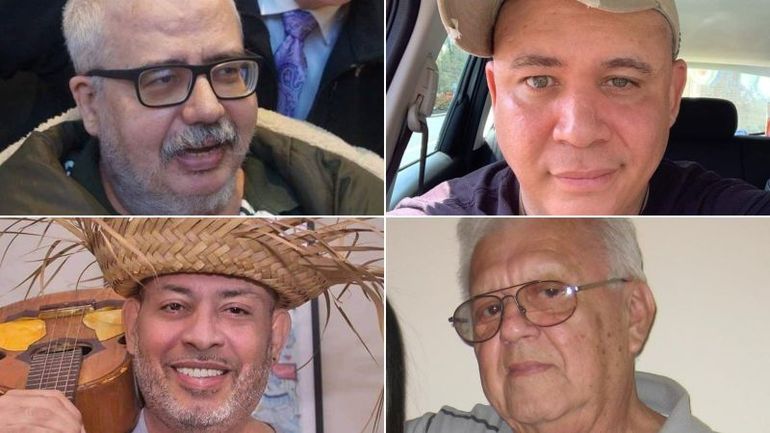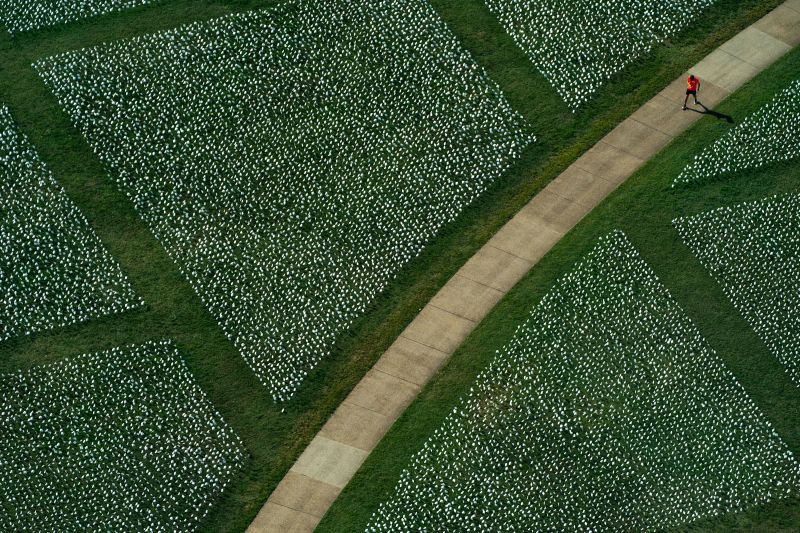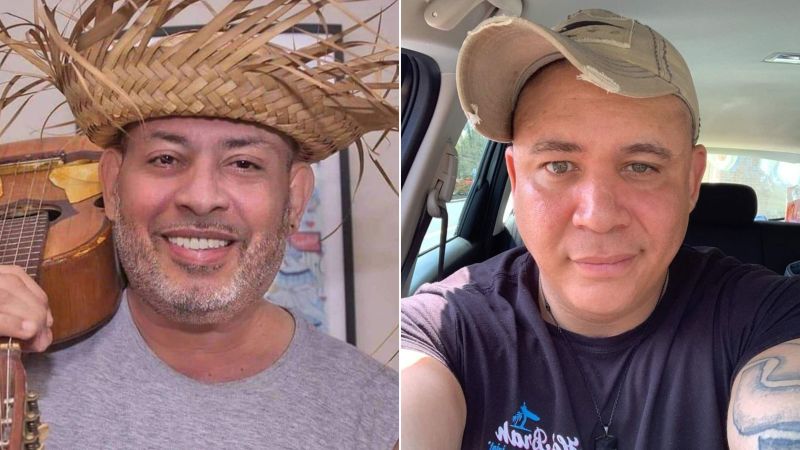
Coping with the Aftermath: Honoring Loss in a Post-Covid Era

While the world shifts its focus away from the Covid-19 crisis that started years ago, many individuals continue to grapple with the enduring sorrow of losing loved ones to the pandemic.
Four years ago, Jody Settle and his partner enjoyed Guinness beers and takeout from an Irish pub in New York City. The pub was empty due to the Covid-19 pandemic.
Sadly, this meal on St. Patrick’s Day was their last together. Settle, aged 58, passed away from the virus on April 19, 2020. He was one of the many people in the United States who lost their lives to Covid-19 since 2020, with the number reaching nearly 1.2 million.
Ed Koenig, Settle’s longtime partner, fondly recalls the peaceful expression on Settle’s face during his final visit to the hospital. With Willie Nelson’s rendition of “Always On My Mind” softly playing in the background, Koenig gently kissed Settle’s forehead while wearing protective gear.
A year ago, the World Health Organization officially declared an end to the global public health emergency caused by Covid-19. Following this announcement, the United States allowed its own public health emergency declaration to expire just under a week later.
Stay-at-home orders have long ended, and much of society has moved on from the pandemic.
But Covid-19-related grief lingers for millions.
On the fourth anniversary of Settle’s death, Koenig turned to the Covid-19 remembrance website WhoWeLost to express his need to mourn. He wrote, “Yes, indeed, you will always be on my mind.”
The website, established in 2020 in Kentucky, is a sanctuary for Koenig and many others. With approximately 2,000 stories already shared and more waiting to be published, it offers a safe space for individuals still grappling with grief. Founder Martha Greenwald designed the platform as a place free from comments, judgment, internet trolls, and the negative aspects of social media discussions related to the virus. This includes debates on the validity of Covid-19 itself.
"It's a safe space for them to express their feelings without facing any harsh criticism," mentioned Greenwald, a poet and former English professor hailing from New Jersey.
Living in Louisville, Kentucky, Greenwald initiated The WhoWeLost Project to support grieving individuals in Kentucky. The idea stemmed from the state's public health commissioner's call in October 2020 for residents to voice their Covid-19 worries. The project provides writing prompts and assistance for those seeking to share their memories. Following a well-received 2021 feature on the website by an NPR affiliate, Greenwald expanded the initiative nationally.
Greenwald told CNN that he believes the site's importance has increased due to fewer people paying attention to Covid-19. He mentioned that it is one of the few places still focusing on the issue.
People visit the 'In America: Remember' public art installation near the Washington Monument on the National Mall in Washington, DC, on September 20, 2021.
People are drawn to the 'In America: Remember' public art installation located near the Washington Monument on the National Mall in Washington, DC.
The installation was captured in a photograph taken on September 20, 2021, by Kent Nishimura from the Los Angeles Times.
Dealing with grief caused by Covid-19
Studies on the impact of the pandemic have shown that family members mourning the loss of loved ones to Covid-19 are more likely to suffer from prolonged grief disorder than in times before the pandemic.
Prolonged grief disorder affects a significant portion of adults and children, with rates ranging from 7% to 10% for adults and 5% to 10% for children, as reported by the American Psychiatric Association. A study conducted in 2023 in the United Kingdom revealed that individuals were over three times more likely to display symptoms of prolonged grief disorder 13 months after losing a loved one during the pandemic compared to before the pandemic.
On WhoWeLost.org, Greenwald observed that many individuals feel a lingering sense that their grief and the memories of their loved ones were not properly acknowledged or expressed. Particularly for those who lost loved ones early on in the pandemic, the absence of funerals meant that important stories and memories were left untold. This platform provides them with an opportunity to document and share these stories that were never shared during a traditional wake.
New York City resident Wiandy Santiago lost her 65-year-old brother Wilmard Santiago to Covid-19 in April 2020. He passed away just a week after being put on a ventilator. Due to restrictions, the family could only have 10 people at the funeral, standing 6 feet apart. As a result, they couldn't hold a service for him until two months later.
Wiandy Santiago expressed that she was unable to grieve her brother in person with her family.
Wiandy Santiago shared with CNN that they mourned the loss of their stepson, Alberto Locascio, through a Zoom call. Santiago expressed how different it was to not be able to physically sit beside a loved one while grieving the passing of a sibling, spouse, or child. Alberto Locascio tragically passed away from the virus in September 2021, just a week before his 40th birthday.
"It's hard to understand why the pain lingers unless you've experienced it," she shared on WhoWeLost.org, describing the grief as complex.
Her eyes welled up as she talked about her big brother's passing. She often wonders about his last moments, as he passed away in a Bronx hospital without his wife and sons nearby.
Santiago wondered about his feelings, whether he was scared or not, as tears streamed down her face and her voice trembled with the sorrow of not being able to bid farewell. She found comfort in sharing memories of her departed loved ones through the WhoWeLost initiative.
Wilmard Santiago, left, and Alberto Locascio died of Covid-19.
Wilmard Santiago, left, and Alberto Locascio died of Covid-19.
For the last two years, Wiandy Santiago has been using the site to share heartfelt stories about her brother and stepson. She writes about how Wilmard had a passion for photography and the Yankees, and how Locascio was a loving and caring person who was like a protector to their family. Recently, she shared that looking at prom photos of Locascio’s son on Facebook brought up a range of emotions for her.
“I was sad for Nicholas who would have loved to have his dad there with him. So happy, yet so sad,” Santiago wrote.
She opens up about her lingering grief in many of the posts.
"I believe that writing can help with healing by allowing us to release our emotions," she shared.
Greenwald, who is a special adviser for Rituals in the Making, a research project conducted by the anthropology department at George Washington University, also agrees. The project has looked into how people coping with loss adjust when their usual rituals, such as funerals, are disrupted.
"Rituals play a significant role in acknowledging the loss for the surviving family and friends," explained Sarah Wagner, who leads the Rituals in the Making research project. "Without proper recognition, the grieving process can become prolonged and more intense, as we are witnessing during the pandemic."
It is important for individuals to have a safe space where they can grieve in their own way.
Koenig initially sought support on social media after losing loved ones to Covid-19. However, he encountered issues as trolls would often make hurtful comments to mourners.
In response to his posts grieving Covid-19-related deaths, Koenig would often receive insensitive remarks like, “Covid isn’t real, they died of something else.”
During the pandemic, as Covid-19 deaths continued to rise, there was a concerning trend of misinformation spreading in society. This was often fueled by political polarization, leading some to disregard the seriousness of the virus. Despite evidence from public health experts, there were even those who denied the existence of the virus altogether.
A study conducted in 2020 by YouGov revealed that 13% of individuals polled in the US believed that the coronavirus, or the virus responsible for causing Covid-19, was not real. Furthermore, claims that either denied, downplayed, or spread disinformation about Covid-19 were deemed the "lie of the year" by Politifact, the fact-checking website of the Poynter Institute.
Koenig recalled reading the most offensive remarks he saw were expletive-filled death wishes hurled toward the LGBTQ+ community.
He remembered one message saying, “All you perverts are going to hell anyway, so what difference does it make?”
At WhoWeLost.org, individuals dealing with prolonged grief can freely share their stories without being exposed to negative online discussions, according to Greenwald. She mentioned that many of the comments she has come across involve criticizing individuals who have experienced multiple conditions or illnesses simultaneously.
Greenwald explained that if someone shared that their mother passed away from cancer, they would receive the typical condolences. However, if the cause of death was Covid, the comments might shift to questioning if the deceased had other health issues like heart problems or was a smoker.
Even when no one is shaming them or denying Covid-19, Greenwald mentions that the bereaved may feel like nobody is interested in hearing about their struggles.
Greenwald reassures that the WhoWeLost project is always there to listen.
A person is tested at a Covid-19 testing van in New York's Times Square on May 3, 2022.
A person is tested at a Covid-19 testing van in New York's Times Square on May 3, 2022.
Many people feel that their co-workers avoid talking about certain topics or act uncomfortable. However, there are still those who are interested in hearing your thoughts, even if others may not be as open to discussing them.
Paige Gavin, a master’s student working on Rituals in the Making, shared her thoughts on WhoWeLost: “I believe one of the benefits of WhoWeLost is that mourners can focus on the positive aspects of their loved one’s life, not just their passing. It also provides a platform for them to share their stories.”
According to Wagner, WhoWeLost serves as a platform for the bereaved to commemorate their loved ones in a way that feels right for them.
Wagner believes that amidst the heavy politicization, this is a chance for individuals to remember that Covid did not solely define their loved ones. Despite the divisive nature of Covid, there is room for conversations that go beyond the virus.
Editor's P/S:
The article paints a poignant picture of the enduring grief experienced by those who have lost loved ones to the Covid-19 pandemic. It highlights the importance of creating safe spaces and offering support to individuals who may feel isolated or misunderstood in their mourning process. The WhoWeLost initiative provides a valuable platform for bereaved individuals to share their stories, connect with others, and find solace in remembrance.
Prolonged grief disorder, a condition that can affect both adults and children, has been shown to be more prevalent among those who have lost loved ones to Covid-19. The pandemic has disrupted traditional mourning rituals, making it difficult for individuals to process their emotions and find closure. The article emphasizes the need for continued awareness and support for those who are struggling with prolonged grief.









